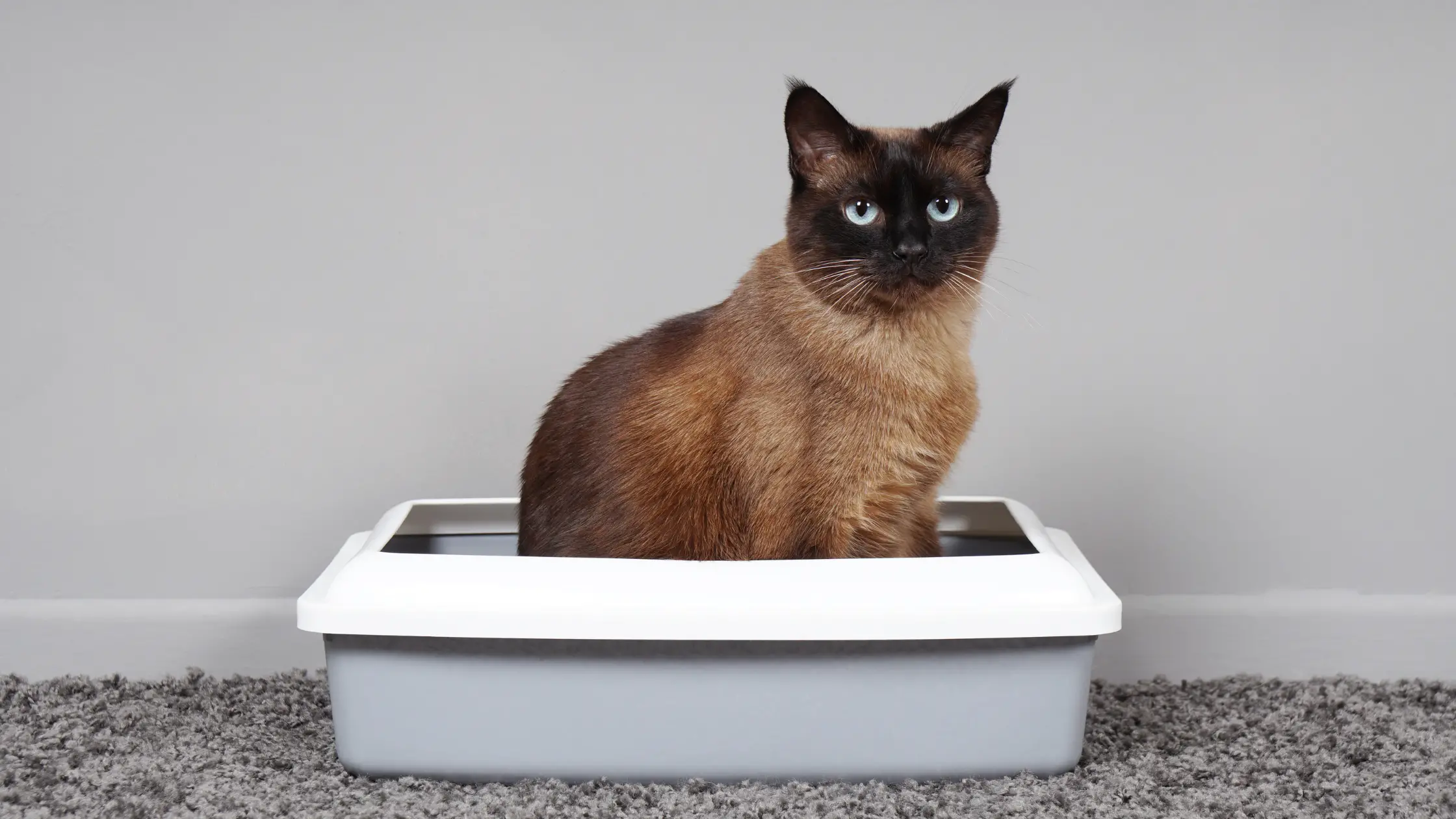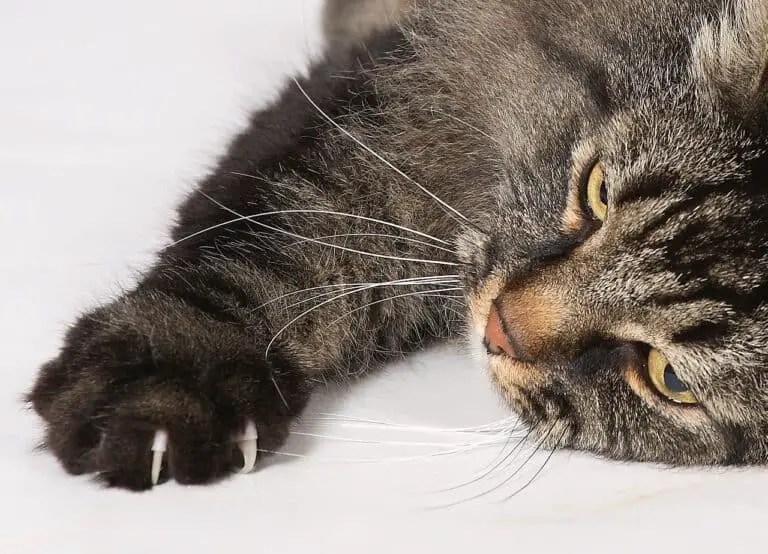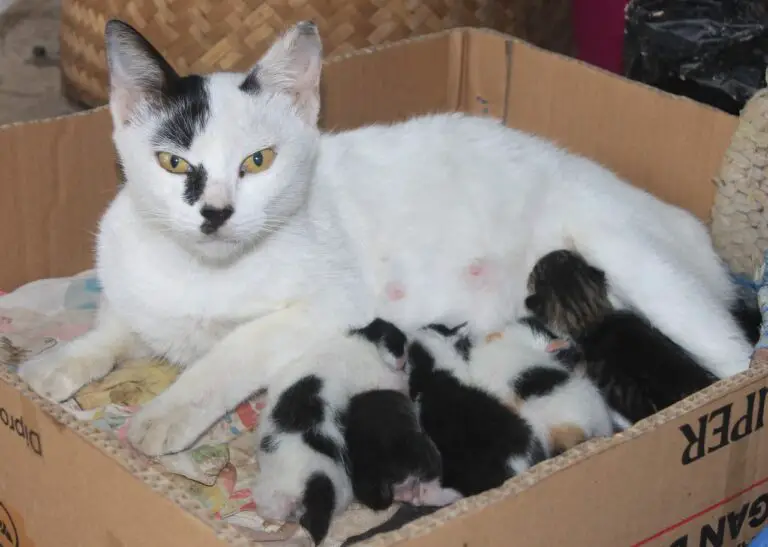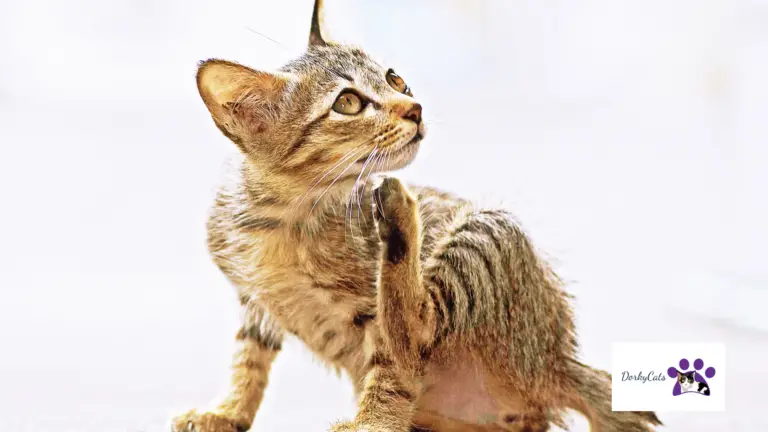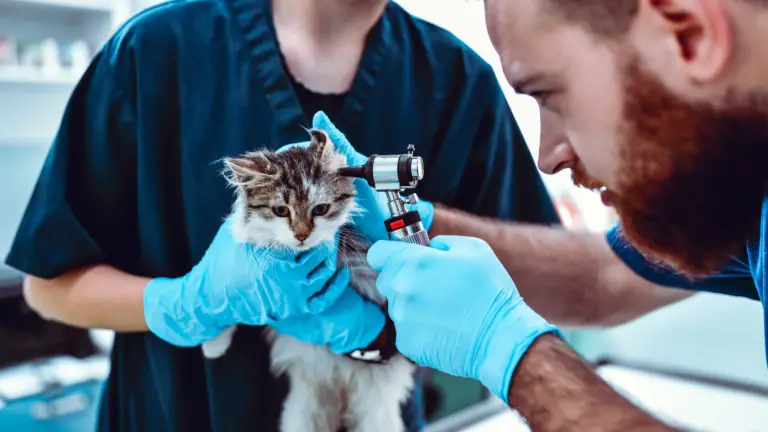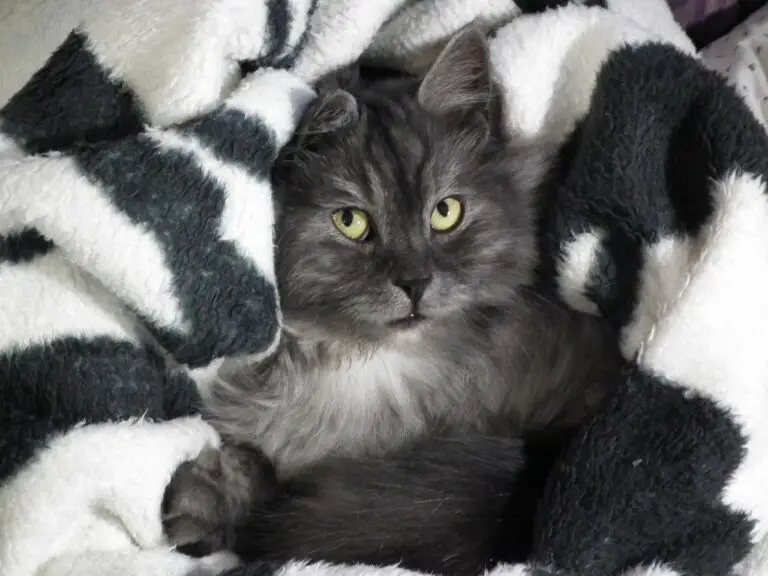CAN CATS SPRAY AFTER BEING NEUTERED? 7+ REMEDIES
Can cats spray after being neutered? In some cases, a neutered male cat may continue to spray if he developed the behavior before being neutered or if the behavior is caused by factors other than hormones, such as stress or anxiety.
While neutering can significantly reduce the likelihood of a male cat spraying, the behavior is not guaranteed to stop entirely.
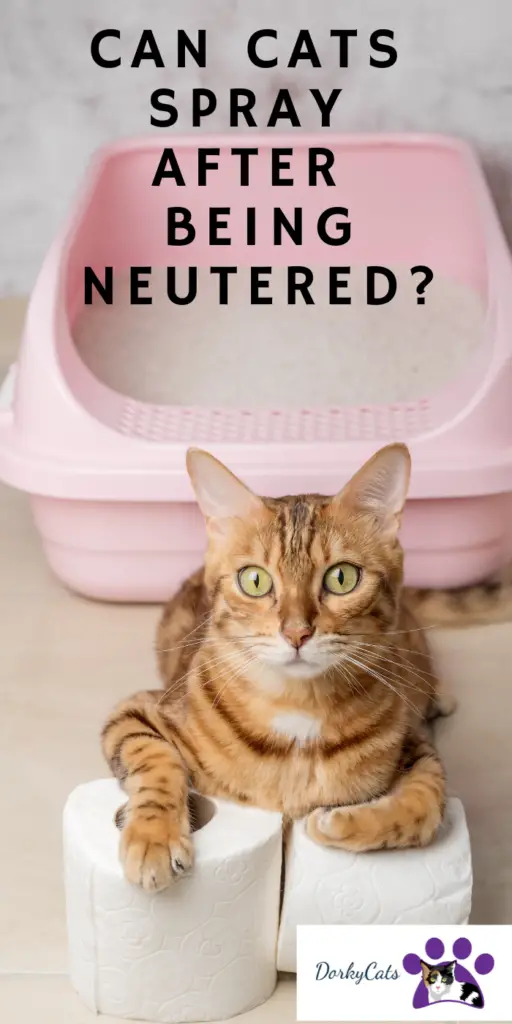
WHY DO CATS SPRAY AFTER BEING NEUTERED?
Neutering can reduce the instances of cats spraying and, in some cases, can successfully eliminate such a behavior, but not always.
In some cases, a cat may continue to spray after being neutered for several reasons:
1. LEARNED BEHAVIOR
If a cat has been spraying for a long time before being neutered, the behavior may have become a habit that is difficult to break.
2. ANXIETY OR STRESS
Neutering can help reduce aggression and anxiety in male cats, but it may not eliminate the behavior. If a cat feels anxious or stressed after being neutered, it may continue to spray to mark its territory or cope with its emotions.
3. MEDICAL ISSUES
In rare cases, a neutered male cat may continue to spray due to an underlying medical condition, such as a urinary tract infection or bladder stones.
4. OTHER CATS
Even if a male cat has been neutered, other cats in the household or outside can trigger spraying behavior to establish dominance or mark territory.
It’s essential to work with a veterinarian or animal behaviorist to determine the underlying cause of spraying behavior in a neutered male cat and develop an appropriate treatment plan to address the behavior.
WHY DO CATS SPRAY?
Cats can begin spraying at any age, but the behavior is most common in sexually mature cats who have not been neutered or spayed.
In unneutered male cats, spraying behavior typically starts between 6 and 12 months of age, when they reach sexual maturity. Female cats can also spray, which is less common and typically occurs during heat cycles or when they feel threatened.
It’s important to note that not all cats will spray, even if they are unneutered or unspayed. The tendency to spray can vary depending on the individual cat’s personality, environment, and other factors.
Cats spray for several reasons, including:
1. MARKING THEIR TERRITORY
Marking their territory: Spraying is a way for cats to mark their territory and communicate with others. The urine they release contains pheromones that convey information about their sex, age, and status, which can help prevent conflicts with other cats.
2. ATTRACTING A MATE
Unneutered male cats may spray to attract a mate, as the pheromones in their urine can signal their readiness to mate.
3. STRESS OR ANXIETY
Cats may also spray in response to stress or anxiety, such as a change in routine or environment, the introduction of a new pet, or conflict with other cats in the household.
4. MEDICAL PROBLEMS
Sometimes, spraying behavior can indicate an underlying medical condition, such as a urinary tract infection or bladder stones. If your cat suddenly starts spraying or exhibits other unusual behavior, it’s essential to consult with a veterinarian to rule out any underlying health issues.
5. BEHAVIORAL ISSUES
Finally, spraying can sometimes be a learned behavior or a habit a cat has developed. This is more likely to occur in unneutered male cats but can also happen in other cats as well.
Overall, cats spray for many reasons, and addressing the underlying cause of the behavior is critical to stopping it. Consulting with a veterinarian or animal behaviorist can help you develop a plan to address spraying behavior in your cat.
CAN CATS SPRAY AFTER BEING NEUTERED?
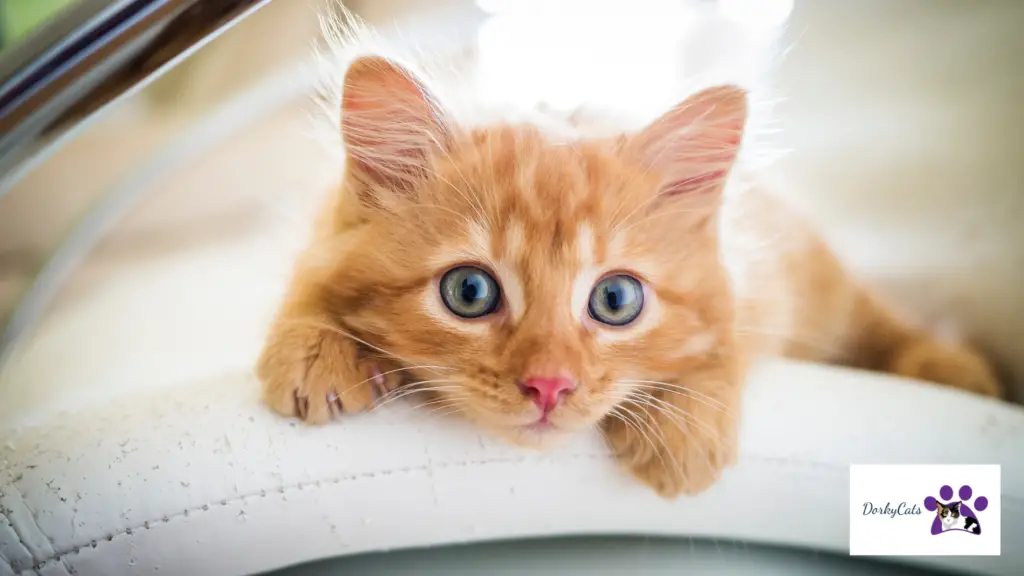
Neutering is a surgical procedure that removes the testicles in male cats, reducing their hormone production, which can lead to undesirable behaviors such as spraying.
While neutering can significantly reduce the likelihood of spraying, a male cat is not guaranteed to stop spraying entirely.
Additionally, if a cat was neutered later in life after developing the spraying behavior, it may take some time for the behavior to diminish or stop altogether. However, neutering is generally an effective way to reduce spraying in male cats.
DO FEMALE CATS SPRAY AFTER BEING FIXED?
Female cats can spray urine like male cats, but it is less common in females than males.
Spaying, the surgical procedure that removes a female cat’s ovaries and uterus, can reduce the likelihood of spraying in female cats. In addition, it can reduce their production of hormones that can lead to the behavior.
In some cases, female cats may continue to spray if they develop the behavior before being spayed or if it is caused by factors other than hormones, such as stress or anxiety.
WHAT DOES NEUTERED CAT SPRAY SMELL LIKE?
A neutered male cat should not produce a strong or offensive odor when he sprays, as neutering typically reduces or eliminates the production of the hormones that cause the urine to have a strong, musky scent.
However, suppose a neutered male cat continues to spray. In that case, the odor of the urine may be similar (although less intensive) to that of an intact male cat, with a strong, musky scent often described as unpleasant or offensive.
The odor can be particularly strong if the urine is allowed to sit and dry, and removing the smell from surfaces or fabrics can be difficult.
Additionally, cleaning areas where the cat has sprayed thoroughly and using odor-eliminating products can help reduce the smell and discourage the cat from spreading in that area again.
WHAT DOES CAT SPRAY LOOK LIKE?
Cat spray is a form of marking behavior in which a cat deposits urine on vertical surfaces such as walls, furniture, or doors. The urine used for marking usually contains pheromones that serve as a chemical signal to other cats.
Cat spray typically looks like a small amount of urine deposited on a vertical surface in a high, generally shoulder-level location. The spray pattern may appear as a series of droplets or as a stream, depending on the cat’s position and the force with which the urine is expelled.
The color of cat spray can vary depending on the cat’s hydration levels and diet. Still, it is typically yellowish and has a strong, musky odor different from regular urine. The odor is often described as pungent, sharp, or acrid, and it can be challenging to remove from surfaces or fabrics.
HOW LONG DOES IT TAKE FOR A CAT TO STOP SPRAYING AFTER BEING NEUTERED?
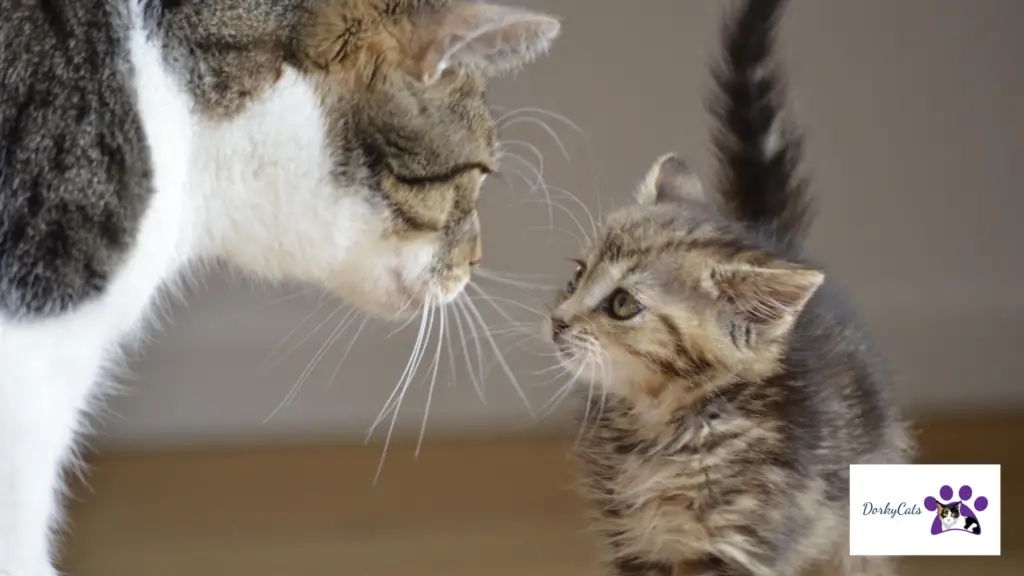
The length of time it takes for a cat to stop spraying after being neutered can vary depending on a variety of factors, including the cat’s age, personality, and the circumstances that led to the spraying behavior in the first place.
In some cases, a cat may stop spraying immediately after being neutered. In contrast, in other cases, the behavior may take several weeks or even months to diminish or stop altogether.
It’s important to note that neutering does not guarantee a cat will stop spraying entirely.
HOW TO STOP A CAT FROM SPRAYING INDOORS?
Here are some steps you can take to help stop a cat from spraying indoors:
1. NEUTER OR SPRAY THE CAT
One of the most effective ways to stop spraying behavior in cats is to have them neutered or spayed. This reduces their production of hormones that can cause spraying.
2. IDENTIFY THE CAUSE OF STRESS
Stress is a common trigger for spraying behavior in cats. Identifying and addressing the cause of stress can help reduce or eliminate spraying. Common sources of stress include changes in routine or environment, conflict with other pets in the household, or a lack of socialization or environmental enrichment.
3. PROVIDE ENVIRONMENTAL ENRICHMENT
Providing your cat with a stimulating and enriching environment can help reduce stress and prevent spraying. This can include providing plenty of playtimes, toys, scratching posts, and comfortable resting spots.
4. CLEAN THE AREAS AFFECTED
If your cat has already sprayed, cleaning the affected areas thoroughly to remove the odor and discourage further spraying is important. Use an enzymatic cleaner specifically designed for pet urine, and avoid using cleaning products that contain ammonia, as this can attract cats to spray.
5. LITTER BOX
Ensure your cat has access to a clean and comfortable litter box. Cats may spray if they are experiencing discomfort or dissatisfaction with their litter box.
6. CONSULT WITH A VETERINARIAN OR ANIMAL BEHAVIORIST
If the spraying behavior persists, it’s important to consult with a veterinarian or animal behaviorist for additional advice and guidance. Medication or other behavioral interventions may sometimes be necessary to help stop the behavior.
WILL MY CAT STOP SPRAYING AFTER BEING NEUTERED
Neutering can significantly reduce the likelihood of a male cat spraying, as it removes the source of hormones that can lead to the behavior. However, no cat is guaranteed to stop spraying entirely after being neutered.
Factors such as the cat’s age, personality, and the circumstances that led to the spraying behavior in the first place can all affect whether the cat continues to spray after being neutered.
Sometimes, it may take some time for the cat’s behavior to change after the procedure.
It’s important to note that neutering is not a cure-all for cat spraying behavior. Additional interventions may be necessary to address the behavior if it continues after the procedure.
CAT SPRAYING VS. PEEING – WHAT IS THE DIFFERENCE?
Cat spraying and peeing are two different behaviors in cats, although they can appear similar to the untrained eye.
Spraying is when a cat marks its territory by releasing a small amount of urine on vertical surfaces such as walls or furniture. The urine is typically strong-smelling and may contain pheromones communicating information to other cats.
Spraying is more common in unneutered male cats but can also occur in females and neutered males.
On the other hand, Peeing is a behavior in which a cat eliminates waste by urinating in a litter box or a different appropriate location. This behavior is essential for a cat’s health and well-being, and cats typically learn to use a litter box as kittens.
The main difference between spraying and peeing is the purpose of the behavior.
Spraying is a territorial behavior. Communicating information to other cats while peeing is an essential bodily function. Additionally, spraying tends to be done on vertical surfaces, while peeing is done on horizontal surfaces such as the floor or in a litter box.
If you’re unsure whether your cat is spraying or peeing, observe their behavior closely and look for clues such as the location and posture during elimination, the amount of urine produced, and the presence of other behavioral cues such as tail twitching or vocalization.
LEGGI ANCHE: WHY DO CATS SMELL FEET? 5+ FUNNY FACTS TO KNOW

